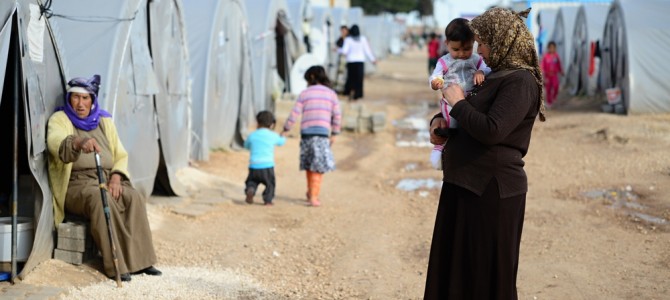
In the aftermath of the fall of Saigon, the United States took in 120,000 South Vietnamese refugees. In the long and sad story of the Vietnam War, this is one thing of which Americans can be justly proud.
Today the United States should not only accept the 10,000 Syrian refugees it has signed up for, it should dramatically ramp up its refugee program specifically for Iraqis and Afghans. We have a special obligation to them.
That said, I want Americans to make an informed decision about the costs, tradeoffs, and context of the refugee program.
1. Accept More Terrorism Risk
You are not a terrible person if you worry that terrorists will try to sneak into the United States under cover of the refugee program. It doesn’t take bigotry or Islamophobia, only a small degree of knowledge about what terrorists want and a miniscule bit of imagination about how terrorists might operate.
The United States makes it hard for people to get refugee status, so it is unlikely that many terrorists will make it through. But it only takes a handful to launch an attack. Welcoming the refugees marginally raises the risk of domestic terrorism. It is rational to ask if the tradeoff is worth it. I think it is.
2. Accept More Surveillance
Because governments are aware of the growing risk of terrorism, they have taken steps in recent years to increase domestic surveillance and augment their police powers. This is the cost of living in a globalized world and is nearly inevitable unless the American people are prepared to undo a century of growing international connectedness. Accepting refugees is another small invitation to the outside world.
The American people have accepted a bargain, whether they understand it or not. In exchange for easy international travel, cheap South Korean electronics, Chinese financing of U.S. deficit spending, and the moral glow of welcoming international refugees to our shores, the American people accept the world’s most sophisticated police state.
By “police state,” I don’t mean “authoritarian,” “brutal,” or even “unconstitutional.” I simply mean a massively powerful, technologically enhanced, multibillion-dollar ability to watch, eavesdrop, and hack with cameras, drones, and viruses. Such a concentration of power is necessary, given the realities of terrorism in a globalized world, and should also be deeply troubling to advocates of limited government and civil liberties. I see no way around this paradox.
3. Realize The Syrian Refugees Are the Tip of the Iceberg
I am happy to see Americans concerned about the humanitarian plight of the Syrian people. I am concerned, however, that Syrians are the happy recipients of our newfound concern for our fellow man principally because they happen to be suffering within sight of the cameras.
There is a nearly endless litany of human suffering in the world today. I invite you to do a little reading about the plight of humanity: try the United Nations “Human Development Report” for a global look at poverty, illiteracy, and sickness; the State Department’s “International Religious Freedom” report for a look at religious oppression; or Freedom House’s “Freedom in the World” report for a snapshot of civil liberties and political freedom around the world.
The Syrian refugees are the tip of the iceberg. I’d like to see the U.S. government prioritize refugees from Afghanistan and Iraq because of our role in their countries since 2001 and 2003, respectively. But if you want to use U.S. foreign policy as a tool to alleviate the most human suffering possible, our priorities should be to cure malaria and overthrow the government of North Korea.
4. Address the Reason They Became Refugees
If Americans are prepared to make humanitarianism a principle of U.S. foreign policy, we may want to revisit our famous antipathy towards foreign aid, which could be a powerful tool for alleviating human suffering and fostering accountable governance and economic opportunity abroad.
Americans generally hate foreign aid because they think it is a wasteful exercise in charity. In fact, most foreign aid dollars are spent on weapons transfers to partners whose security services are fighting our battles. Foreign aid can and should focus on governance and economic assistance to poor democracies and transitioning regimes. Used that way, foreign aid would be preventative medicine, helping redress the conditions that give rise to refugee crises before they start.
5. Rethink Your Position on Intervention
Finally, the most effective and definitive solution to the refugee crisis would be to defeat those who made them refugees in the first place. Conservatives have been scoring easy points against President Obama for months for his passivity in the face of the unfolding catastrophe in Syria over the last four years. And they’re right to do so.
But if we were truthful, we’d remember that most conservatives opposed intervening in Syria in 2011, 2012, and 2013. All but the most hardened neoconservatives were still traumatized by the debacle of the Iraq War, and Rand Paul appeared to be the rising star of conservative foreign policy.
I argued back in 2012 that intervening in Syria made strategic and moral sense, but believed we shouldn’t do it because we lacked the operational competence and political will to do it right. I believed that an intervention done wrong was worse than no intervention at all. I was wrong. Conservatives are playing the weather vane, opposing intervention in Syria when it was unpopular and advocating for it when it serves their political purposes.
Americans today who argue that the United States should intervene in Syria or increase its presence in Iraq—whether for humanitarian or strategic considerations—should abandon once and for all their antipathy for intervention, stability operations, and nation building. If you want the United States to lead, defend its interests, or even just to make the world a slightly less awful place, start by owning up to what tools are required and what they will cost.
Follow Paul D. Miller on Twitter at @pauldmiller2.









